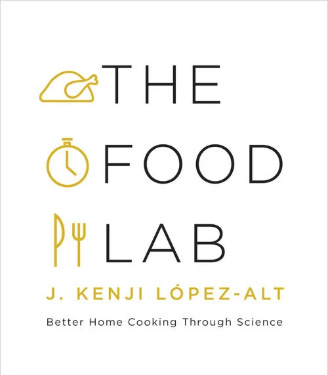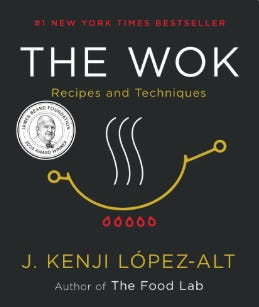Writing Recipes That Teach
A conversation with author Kenji López-Alt
It costs nothing to subscribe to this newsletter, but signing up will keep you up-to-date on the latest news from our community. We also encourage paid subscribers, as these really help us keep the lights on at Everything Cookbooks!
This week, we re-released our conversation with Kenji López-Alt about what it means to develop a voice of authority as a food writer. Known for his science- and technique-based writing, Kenji’s first cookbook, The Food Lab, sold more than half a million copies. We talked to Kenji about where he learned to cook (spoiler: it was from books, not at the stove) and how he got his start as a food writer. I was especially interested to hear how his experiences have shaped his approach to recipe writing.
Early in our chat, Andrea asks about the thinking behind writing such a massive, comprehensive cookbook, and Kenji explains that he doesn’t think of The Food Lab as a cookbook-cookbook. His goal was to create not so much a recipe book as a science book. There are recipes (yes, lots of them), but Kenji intends them as hooks to lure people into wanting to learn the principles behind the dishes.
“The idea was that, for instance, here’s this chili recipe that is 4 pages long and has 47 ingredients, and takes 3 days to make ….It’s not a very practical recipe and not one that I expect people to follow to the letter.”
Kenji admits that even he hasn’t made that chili in years, but the recipe—and all the recipes in the book—are central to the book’s purpose. The table of contents lists hundreds (yes, plural) of recipes for everyday American classics (there are roasts, soups, pastas, scrambled eggs, coleslaw, etc), and every recipe is crowded with sidebars, charts, tips, and process photos. The premise is that people can learn to cook by first reading, absorbing the science-based principles, and then heading into their kitchens to apply the techniques to their own everyday cooking.
We then asked about writing his second cookbook, The Wok, which Kenji wrote after having kids and finding himself with less time to cook. Even though the text is still dense with Kenji’s signature science-based information, the recipes themselves are more streamlined and practical. The approach here is about “writing recipes for people who really just want to get dinner on the table every night.”
Kenji’s responses got me thinking about how the way we write recipes impacts the way readers use our cookbooks—and how our style may evolve over the course of a career. The conversation also reminded me why I keep a diversity of cookbooks on my shelves and how I turn to different books for different reasons.
This Substack is reader-supported. To receive new posts and support the Everything Cookbooks podcast, consider becoming a free or paid subscriber.
Links from the episode:
Kenji López-Alt Website
His Instagram
His YouTube channel
The Food Lab: Better Home Cooking Through Science by Kenji López-Alt
Visit the Everything Cookbooks Bookshop to find books mentioned in the show. (Buying books here supports the show, independent bookstores, and authors. A win-win-win! 🏆)
Next week on EVCB:
We’ll still be on summer break next week, which means we’ll be re-releasing another favorite conversation from the archives on the topic of Voice.
Bye for now. We’ll be back next week and hope you will be, too. In the meantime, keep on writing, reading, and cooking. ✍️📚🍳
Molly and the EVCB gang
Lots of ways to support Everything Cookbooks
There is no cost to subscribe to our Substack — and no pressure — but subscribing helps support the show. We appreciate your ❤️s, comments, and restacks, too. And of course, we welcome paid subscriptions if you’re able. There’s even a special category for superheroes for our super fans.
Shop for EVCB merch on our website, and any book mentioned on the show can be found at our affiliate shop at Bookshop.org. Every bit of support helps!





I am so glad he wasn't positing that people should make 40+ ingredient chili recipe all the time.
I remember listening to this. Great episode.